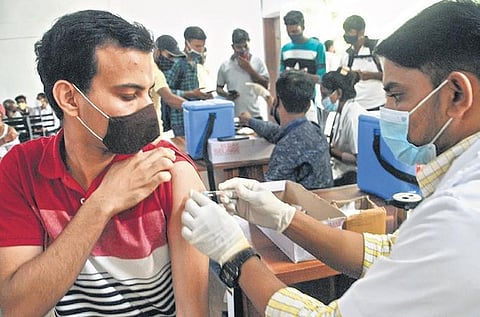

NEW DELHI: In what appears to be the first evidence showing the need of booster doses, especially for those who are immune compromised, researchers found waning antibody levels three-four months after receiving Covaxin and Covishield.
Researchers associated with ICMR’s Bhubaneswar centre and some other government institutions undertook a post vaccination study of 614 healthcare workers. They found that those who did not develop breakthrough infections showed “significant” decline in antibody levels. The findings come in the backdrop of several countries initiating policy decisions on booster doses even as Indian administrators are still waiting for more data.
Of the 614 participants, 308 (50.2%) got Covishield recipients and the rest 306 (49.8%) took Covaxin. The results of 533 individuals without any history of infection post vaccination indicated a significant drop in spike RBD IgG (an antibody against Covid) concentration for both the vaccines.
It was found that the production of vaccine-induced IgG antibodies is significantly higher in Covishield compared to Covaxin. In sero-negative individuals, the rate of sero-conversion after 28 days after the first dose was 81.9% for Covishield and 16.1% for Covaxin.
“We report a significant decline of antibody post 2 months and 4 months among Covaxin and Covishield recipients after two doses of Covaxin and Covishield,” the authors wrote. The findings suggest a larger cohort study which would help to define correlates of protection to determine whether there is a need to produce modified vaccines, or booster doses, they added.
Sanghamitra Pati, a co-author of the analysis, said the participants will be followed up for up to 1- 2 years to make a more definitive assessment on booster doses. “However, we do feel that those with compromised immunity and more vulnerable to serious disease may need booster doses 6-12 months after the second dose.”
Waning antibodies do not preclude immunity as it is now clear that in immunity against SARS-CoV-2, T cell mediated immunity plays a critical role, said immunologist Dipyaman Ganguly. “Moreover, the absence of circulating antibodies does not also exclude maintenance of memory B cells which can be commissioned for fresh antibody production on re-exposure to the virus.”